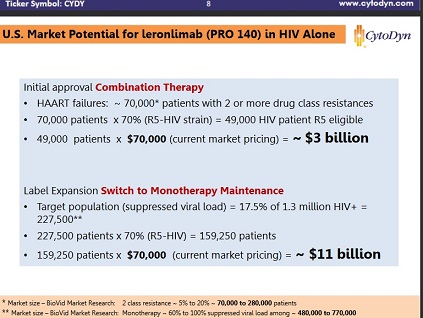CYDY- Leronlimab (Pro 140) CCR5 Inhibitor Websit
Post# of 157634

Website: www.cytodyn.com
SP 51c
Market Cap 150M
Market Potential $20B+
Share price has been suppressed due to dilutive fund raising (selling shares for cash), which is about to change:
https://www.cytodyn.com/media/press-releases/...l-with-fda
Quote:
We are also pleased to report that we have initiated planning meetings with potential commercialization partners to provide their distribution channels for sales of leronlimab immediately following our anticipated approval. The anticipated partnership structure may take the form of upfront investment in CytoDyn in exchange for a royalty post approval . All the structures we are considering are in line with our desire to pursue non-dilutive financing options. We are also negotiating with several large manufacturing companies to add $500 million worth of inventory to our current commercial inventory for deferred payments after approval. ”
Safety: Safe as your momma's love
- 600 Patients not a single adverse event
- Unlike other CCR5 inhibitors, does not block other ccr5 activity allows chemokines to bind
Combo HIV ( Leronlimab + 2 HAART Drugs)
-Passed Phase 3, 81% competition (with IV) that was approved had 45%
-BLA will be submitted by June 2019
- APPROVAL in 2019 within 6 months with fast track designation
- $3B Market
Mono HIV (Leronlimab only)
-92% success at 750mg dose in Phase 3 investigatory trial
-Phase 3 Pivotal trial starting in 2019
-$11B market

Second Opinion Evaluation Model
https://finesand.wordpress.com/2019/01/14/cyt...ion-model/
Cancer Metastasis
-CCR5 is turned on in all cancer metastasis, allowing cancer cells to move throughout the body
- Dr Richard Pestell who discovered this in 2012 and held the patents to using CCR5 inhibitors with cancer, recently joined the company. He sold the patents and his almost approved prostate cancer test for shares of CYDY.
-Triple Negative Breast Cancer Phase 2 starts Q1 2019
-Colon Cancer Phase 2 2019
-If successfully will move to CCR5 method of action in all cancers
- Potential all CCR5 positive cancers
- Market Potential 15B+
GvHD
-Phase 2 Trial Starts 2019
-100% Eliminated GvHd with Human BM Transplanted Immune Deficient Mice -Without Pro 140 100% of mice died
-500M Market Potential
Many other potential: Multiple Sclerosis, NASH, Lupus, Rheumatoid Arthritis, Psoriasis, Osteoarthritis, Colitis, other inflammatory bowel, any other autoimmune disorders
Link to latest investors slides:
https://content.equisolve.net/cytodyn/media/9...fea2ae.pdf
Link to the latest presentations
NobleConXV Conference January 29th
IF YOU ONLY WATCH ONE VIDEO HERE, WATCH THIS ONE
http://noble.mediasite.com/mediasite/Play/a08...b6137a611d
11th Annual Biotech Showcase in San Francisco on January 9th
https://event.webcasts.com/viewer/event.jsp?e...b298b85c43
Jan 9th: CytoDyn CEO Nader Pourhassan and CMO Dr. Richard Pestell sat down with Proactive Investors at the 11th Annual Biotech Showcase in San Francisco.
CytoDyn aims to be 'paradigm-shifting' in cancer management with its platform drug leronlimab
Jan 7th: WallStreetReporter Interview with Nader Pourhassan, Ph.D, discussing CytoDyn’s PRO140 monoclonal antibody therapy for HIV and cancer.
Monoclonal antibody HIV treatment w potential FDA approval in 2019
Link to the latest Conference Call on December 12th.
https://78449.themediaframe.com/dataconf/prod...ndexl.html
Link to latest 10Q:
https://www.otcmarkets.com/filing/html?id=131...F02DfgxJ3h
Recent News:
https://www.cytodyn.com/media/press-releases
CytoDyn Announces Productive Conference Call with FDA Regarding First BLA Submission for Leronlimab (PRO 140) Combination Therapy at 700 mg Dose
https://www.cytodyn.com/media/press-releases/...l-with-fda
Share Structure:
https://www.otcmarkets.com/stock/CYDY/security
O/S 292,923,481
Float 241,406,399
SP 51c
Colorectal Cancer- 2016
https://www.cell.com/cancer-cell/fulltext/S15...16)30087-3
Tumoral Immune Cell Exploitation in Colorectal Cancer Metastases Can Be Targeted Effectively by Anti-CCR5 Therapy in Cancer Patients
Gastric Cancer- 2018
https://www.ncbi.nlm.nih.gov/pmc/articles/PMC5983686/
Inhibition of the CCL5/CCR5 Axis against the Progression of Gastric Cancer
Quote:
Our current knowledge leads us to suggest the CCL5/CCR5 axis as a potential therapeutic target in GC.
Pancreatic Cancer -2018
https://www.nature.com/articles/s41598-018-19643-0
CCR5/CCL5 axis interaction promotes migratory and invasiveness of pancreatic cancer cells
Quote:
Taken together, our results demonstrate that CCR5 and CCL5 are potential markers for metastatic PC cancer, and their interaction leads to the increased PC cell invasion. Thus, blocking CCR5/CCL5 axis might prove beneficial to prevent metastasis and provide a more therapeutic strategy to control PC progression.
Blocking ccr5 turns cells from tumor promoting to tumor fighting—beating cancer at its own game:
https://www.cell.com/cancer-cell/fulltext/S15...16)30087-3
This person trying to put into layman’s terms
https://adventuresinlivingterminallyoptimisti...maraviroc/
Quote:
One of the cell types in the innate immune system is the macrophage. Macrophages can either be tumor fighting (“M1-subtype”) or tumor helping (“M2-subtype”). Discovering ways to control macrophages and switch which sub-type they are is an intense area of current research.
In CRC, macrophages within the tumor (“tumor-associated macrophages (TAMs)”) are often of the “tumor promoting” M2-subtype. An area of active research has been to switch (or as scientists say, “repolarize”) these macrophages into M1-subtype tumor fighters. As M1-subtype tumor fighters and members of the innate immune system, macrophages can either attack cancer cells directly or serve as intermediaries to facilitate attack by the adaptive immune system.
Scientists have discovered that one of the master switches for determining whether a macrophage is tumor promoting (M2-subtype) vs. tumor fighting (M1-subtype) is the “CCR5 receptor”. This research has been recently published in the journal Cancer Cell. The exciting thing is that by blocking the CCR5 receptor with a CCR5 antagonist (e.g. Maraviroc), tumor promoting (M2-subtype) macrophages in CRC metastases can be switch (“repolarized”) into M1-subtype tumor fighters!
This not only can initiate direct innate immune system attack on tumors but it also has impacts on chemoresistance of these same tumors! Why is chemoresistance impacted? Recent studies have shown that cytotoxic chemotherapies promote recruitment of tumor promoting macrophages into the tumor – and this is one immune system aspect of chemoresistance. Switching these macrophages into M1-subtype tumor fighters may get rid of this resistance mechanism and also attack the tumor with its own “defense”!
Richard Pestell, Vice Chairman, Chief Medical Officer
Richard is clinician and researcher, who conducted clinical training in oncology and endocrinology. Dr Pestell's postdoctoral research was conducted at the Harvard School of Medicine and Massachusetts General Hospital (1991-1993). Dr Pestell holds a medical degree from the University of Western Australia, and an MD and Ph.D. from the University of Melbourne. He was inducted as a Fellow of the Royal Australian College of Physician, Fellow of the American College of Physicians and Fellow of the Royal Society of Medicine.
His past roles include Executive Vice President at Thomas Jefferson University (TJU has a $5.2B USD annual budget, 22,000 employees, and is located in Philadelphia USA). He was chairman of the Department of Oncology at Georgetown University and Associate Vice President of the Medical Center. As Director of the Sidney Kimmel Cancer Center (2005-2015) and Director of the Lombardi Cancer Center, Georgetown University (2002-2005) he was responsible for the oncology service line and oncology clinical trials and the interface with BioPharma.
He has received >$83M in research grant funding, has more than 700 published works including 44 book chapters, and reviews, is ranked in the world by Google Scholar (#1 cell cycle, #1 prostate cancer, #6 oncology) and received awards for his research discoveries (elected membership to ASCI (American Society of Clinical Investigation), Elected Member, Royal Society of Medicine, the RD Wright Medallion, Elected Fellow, American Association for the Advancement of Science, the Eric Susman Prize in Medicine, Advance Global Australian Award (Biotechnology), a Doctor of Medical Sciences, Honoris Causa, from the University of Melbourne, and awards from Susan G. Komen (Light of Life award, Jamie Brooke Lieberman Award).
Richard is a highly experienced Board Member and Executive with more than 20 years of experience in complex academic medical organizations. He has served on the advisory boards of USA National Cancer Institute-designated Cancer Centers, research institutes and foundations and international research institutes. Based upon his multiple issued patents, Richard was Founder and CEO of ProstaGene (sold to CytoDyn) and LightSeed.
https://www.cytodyn.com/media/press-releases/...d-names-dr
Quote:
CytoDyn Completes Acquisition of ProstaGene and Names Dr. Richard G. Pestell to Board of Directors
 (5)
(5) (0)
(0)